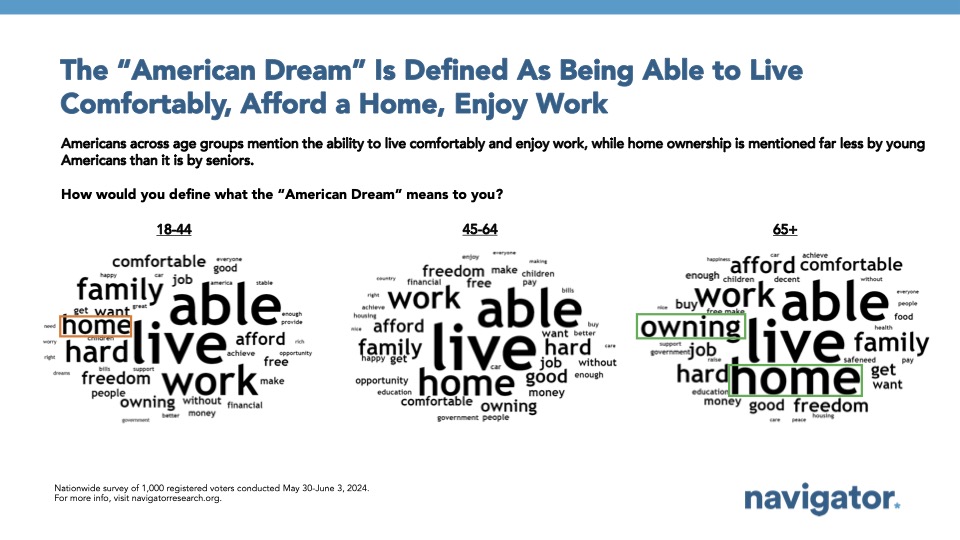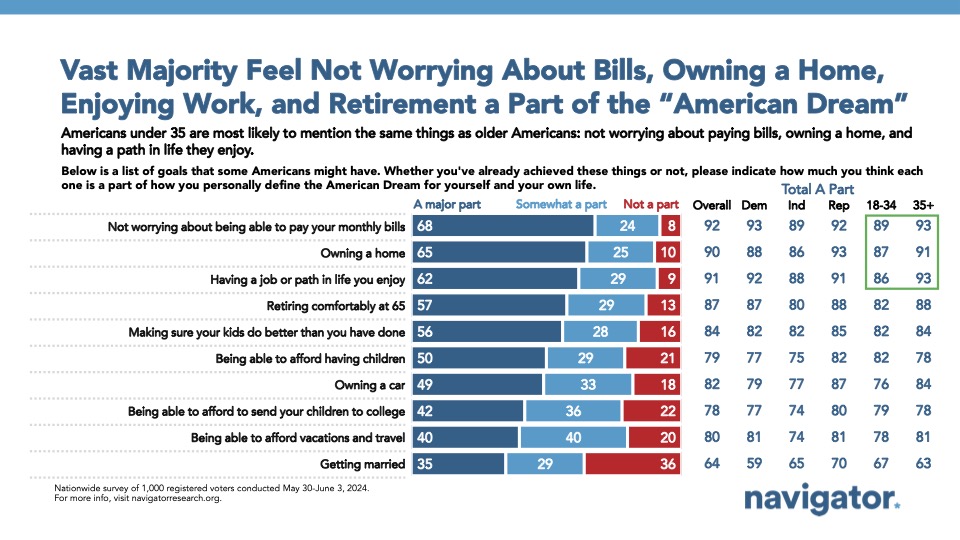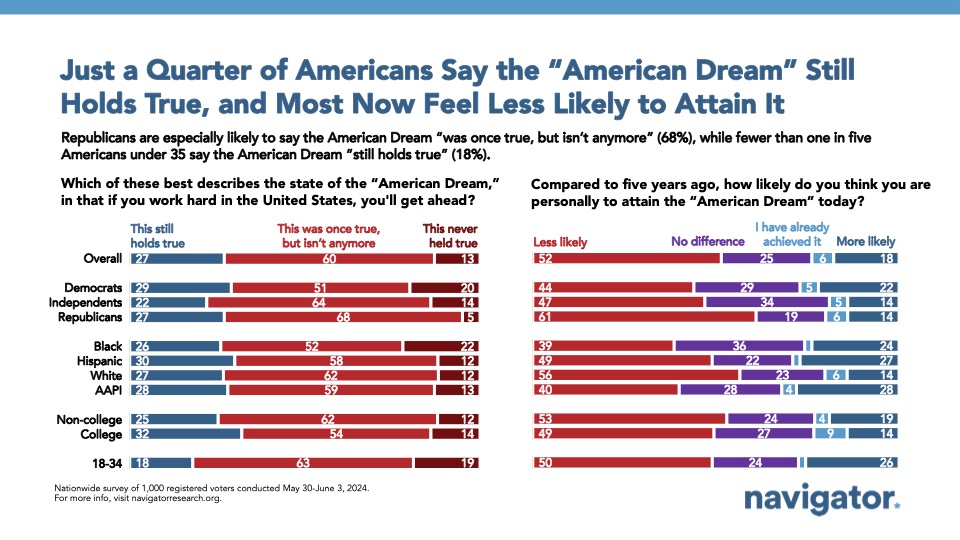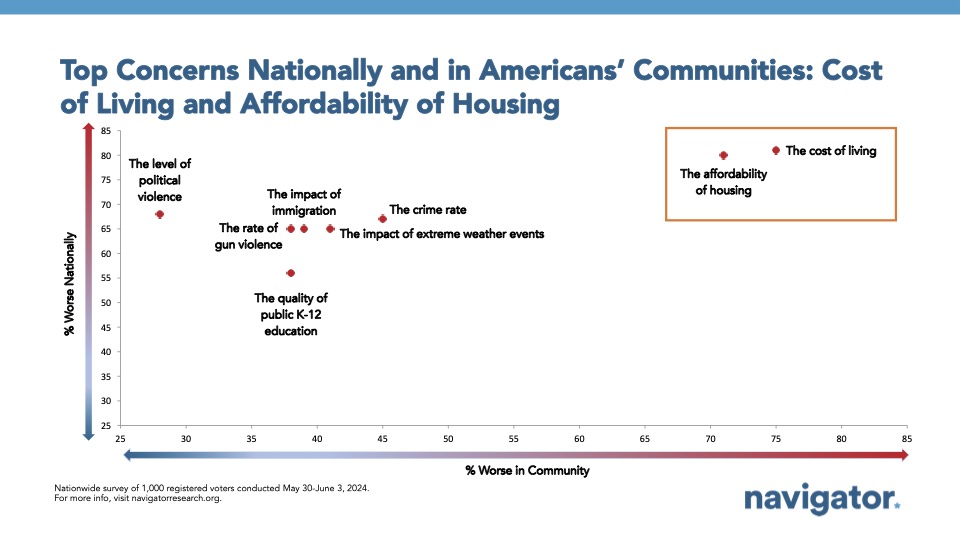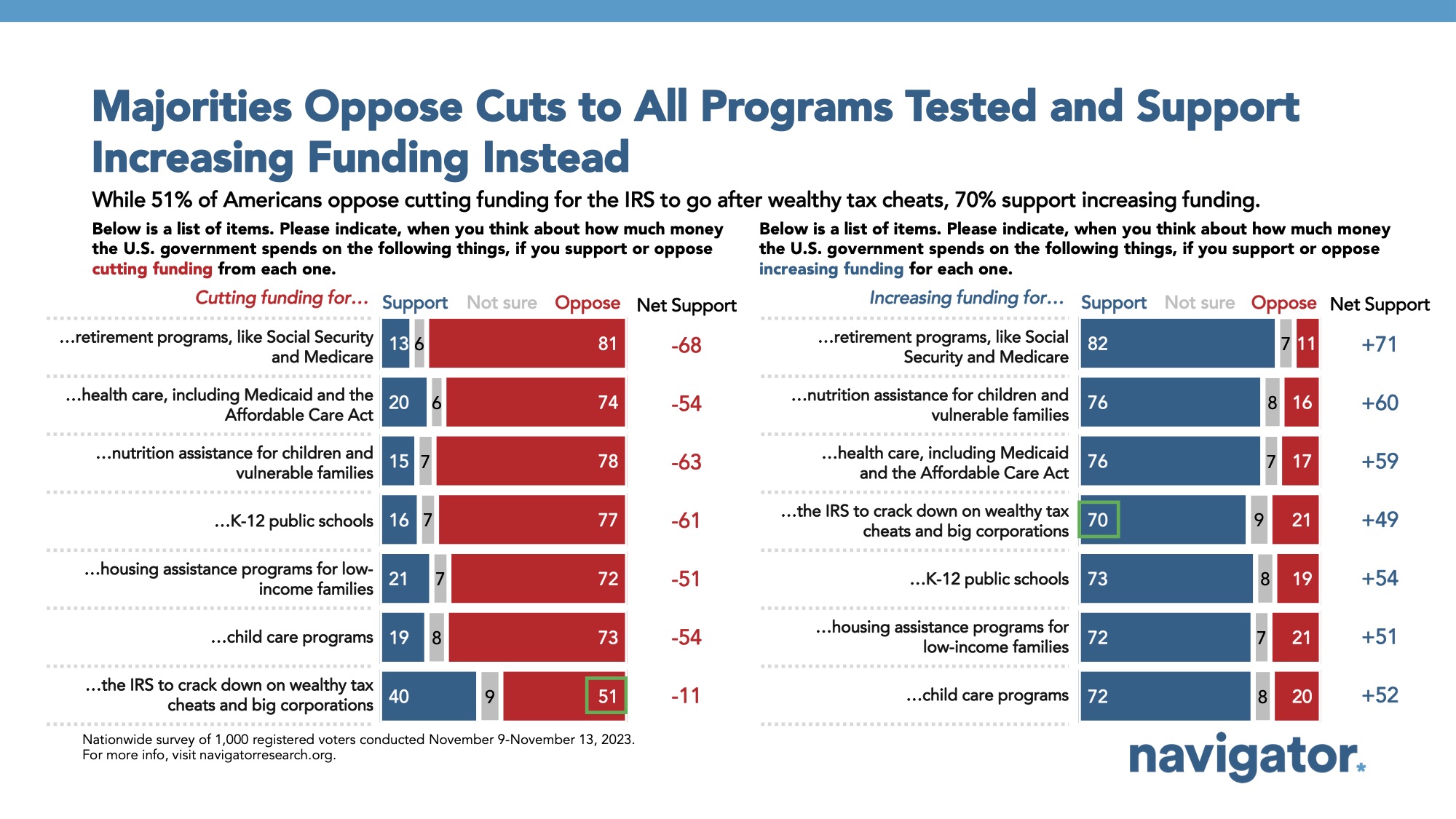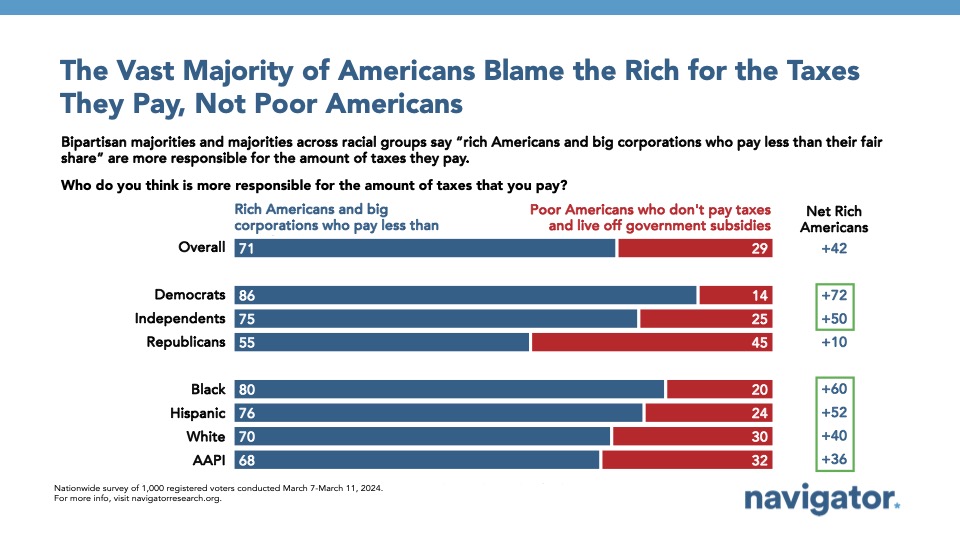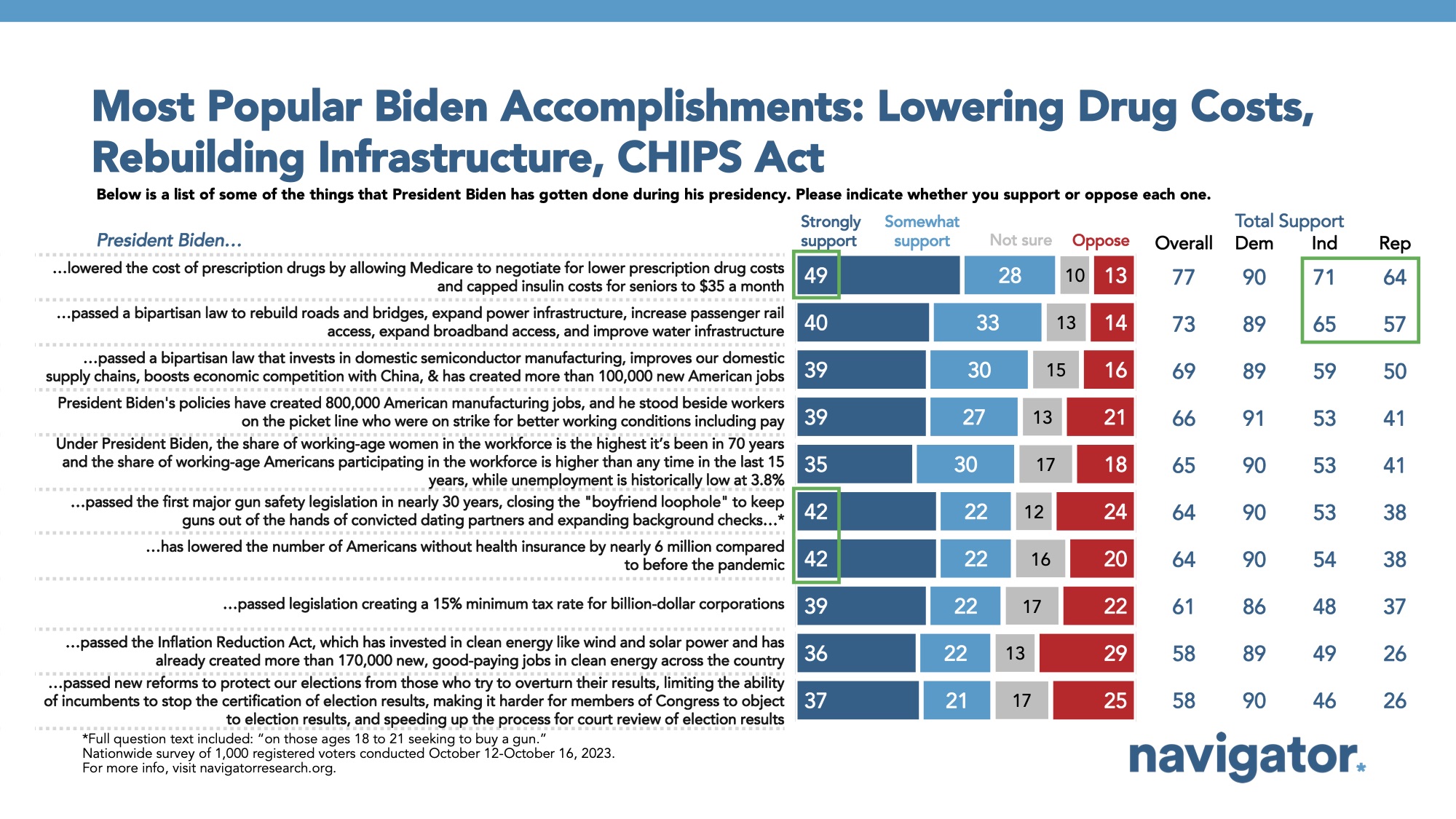Special Report: The American Dream
This is a special Navigator Research report on how well Americans see the state of “the American Dream,” what personal financial goals people most associate with “the American Dream,” and how Americans align “the American dream” with progressive economic policy outcomes.
Poll after poll shows Americans are feeling negatively about the economy and uneasy about their personal finances. According to the latest Navigator data, seven in ten Americans rate the economy negatively (71 percent), with over one in three who rate the economy as “poor” (35 percent), compared to only 4 percent who say the economy is “excellent.” Three in five feel “uneasy” in regards to their personal finances (60 percent), with unease concentrated among those living in households earning less than $50,000 per year (64 percent) compared to those living in households earning more than $100,000 per year (42 percent).
These feelings do not operate within a vacuum and tie in to Americans’ changing feelings about their relationship to the foundational concept of the “American Dream.”
Navigator focus groups often ask participants where they expected to be economically at this point in their lives. In a focus group of young men of color conducted in February 2023, many expressed that they thought they would be on the path of homeownership or have a greater ability to save. In Navigator’s most recent economic journaling qualitative study of Americans across the country, many expressed that they thought they would have savings and the ability to plan for the future and care for their themselves and their families absent of intense financial distress, on top of a general lack of financial security that would allow them to live beyond paycheck to paycheck. It is clear that part of negative economic sentiment is driven by an internalized expectation of personal economic prosperity: as participants cited that they expected that a regular nine to five job should afford them homeownership and financial security that could include disposable income for vacations and an occasional luxury expense.
There was a consistent sentiment that at some point in the past, it was easier, with many citing how their parents indulged in the same life milestones and purchases with less income. Most importantly, respondents today do not identify their current economic status with deeply American expectations of widespread access to economic prosperity.
Psychology Today discusses the role of the “American Dream” in everyday life, explaining: “The [American] Dream has been and continues to be to the American idea and experience. Rather than just a powerful philosophy or ideology, the American Dream is thoroughly woven into the fabric of everyday life. It plays a vital, active role in who we are, what we do, and why we do it… any major deviation from that is a cause for concern if not an outright assault to our national creed.” Additionally, NPR reported that “American Dream” was the most searched term on Investopedia in 2023 when it had not been among one of the top one hundred terms searched in previous years, and that 2023 may have been a milestone in shifting people’s understanding and expectations of the economy This raises two important questions: how do we define the “American Dream,” and how has its definition changed since the phrase was coined?
The phrase “American Dream” originates from a book published in 1931 titled Epic of America, where author James Truslow defines the term as an ability of anyone to achieve their full potential absent of childhood circumstances: “Not a dream of motor cars and high wages merely, but a dream of a social order in which each man and woman shall be able to attain to the fullest stature of which they are innately capable, and be recognized by others for what they are regardless of the fortuitous circumstances of birth of position.” Trulow goes on to specify that “the American Dream” should not be centered on unbridled accumulation of personal wealth and in fact warns against this: “A system that steadily increases the gulf between the ordinary man and super-rich, that permits the resources of society to be gathered into personal fortunes that afford their owners millions of income a year, with only the chance that here and there a few many be moved to confer some of their surplus upon the public in ways chosen wholly by themselves, is assuredly wasteful and unjust system. It is perhaps as inimical as anything that could be the American dream.” Smithsonian Magazine notes that the current definition of “the American Dream” has remained stagnant since the 1950s when the term was used as an argument for consumer capitalist version of democracy in perpetuating the romanticization of rapid accumulation of personal wealth.
- In our most recent Navigator survey, we asked respondents to define “the American Dream” and found the most common words cited were “able,” “live,” “work,” and “home.” Republicans referenced “opportunity” and “the ability to provide for your family” whereas Democrats focused on equal access to education, health care, and the opportunity to succeed. Across party lines, respondents used words such as “survive” and “live above poverty.”
- This survey found the primary components of how “the American Dream” is defined as “not worrying about being able to pay your monthly bills” (92 percent, including 68 percent saying it is a “major” part), “having a job or path in life you enjoy” (91 percent, including 62 percent saying it is a “major” part), “owning a home” (90 percent, including 65 percent saying it is a “major” part), and “being able to retire comfortably at 65” (87 percent, including 57 percent saying it is a “major” part).
Three in five Americans believe the “American Dream” was once true but isn’t anymore.
Today, three in five Americans believe that “the American Dream” — that if you work hard in the United States, you’ll get ahead — no longer holds true. 60 percent of Americans agree it “was once true, but isn’t anymore,” while only 27 percent believe “the American Dream” holds true and 13 percent believe that it “never held true.” Majorities across partisanship agree that it “was once true, but isn’t anymore,” including 51 percent of Democrats, 64 percent of independents, and 68 percent of Republicans.
- This is largely driven by Americans’ perceptions of the current trajectory of the overall economy and their personal financial situations. When this survey asked whether a number of different dimensions of American life were getting better, worse, or staying about the same at both the local level and the national level, majorities of Americans rated only two dimensions as getting worse both nationally and locally: the cost of living (81 percent getting worse nationally; 75 percent getting worse locally) and the affordability of housing (80 percent getting worse nationally; 71 percent getting worse locally). These perceptions correlate to two of the most major parts of achieving “the American Dream”: not having to worry about paying monthly bills and owning a home.
But Navigator’s findings do not suggest these feelings of economic dissatisfaction mean Americans are calling for cuts to core programs that support economic stability – the backbone of “the American Dream.” Another recent Navigator survey found that a vast majority of Americans want increased funding for retirement programs, like Social Security and Medicare (82 percent support), nutrition assistance for children and vulnerable families (76 percent), and health care including Medicaid and the Affordable Care Act (76 percent) — cutting funding for these programs generated wide opposition with four in five Americans opposing cuts to retirement programs (81 percent oppose) and three in five opposing cuts to health care, like Medicaid and the Affordable Care Act (74 percent oppose).
- Americans believe that the government could improve the economy by easing costs such as for housing, tuition, and student debt: “I think the government should enact rent control, universal health care, and raise the minimum wage. For me personally, rent control would be the most impactful as I don’t have a ton of medical expenses and do not make minimum wage.” Another participant succinctly said: “Putting more money into the middle class.”
“The American Dream” represents an ideal to strive towards, and Americans indicate they support reinvigorating this belief by investing in a set of economic policies that create greater opportunity for all. This is demonstrated by the reality that President Biden’s most popular accomplishments include lowering the cost of prescription drugs (77 percent support), the creation of over 800,000 new manufacturer jobs and standing beside workers at a picket line who were on strike (66 percent support), and lowering the number of Americans without health insurance to nearly six million compared to before the pandemic (64 percent support). Despite the widespread belief that “the American Dream” no longer exists, Americans overwhelmingly support a set of progressive economic policies that focus on giving people a little less worry about paying the bills and managing their personal financial situations.

